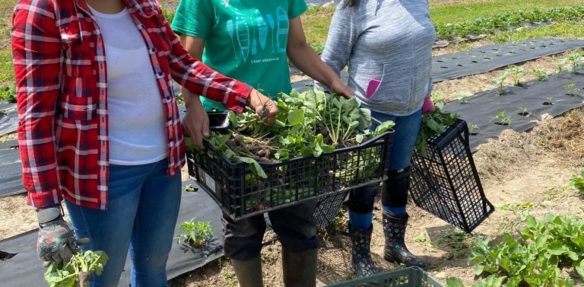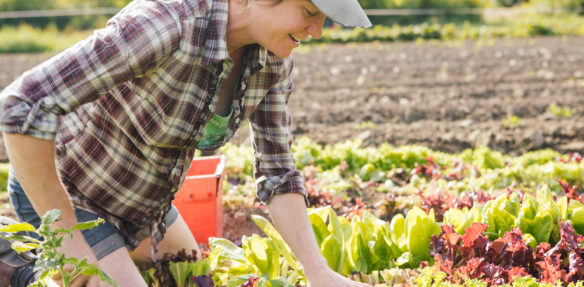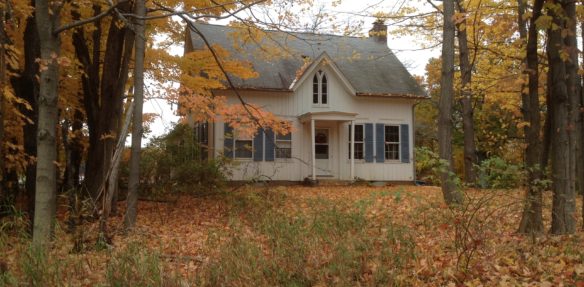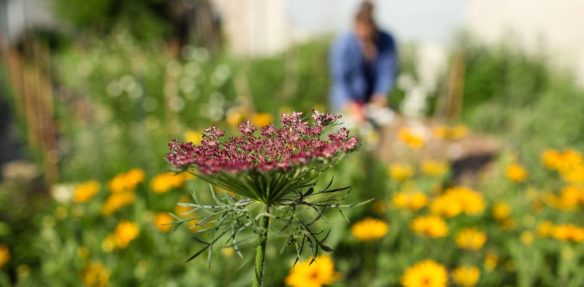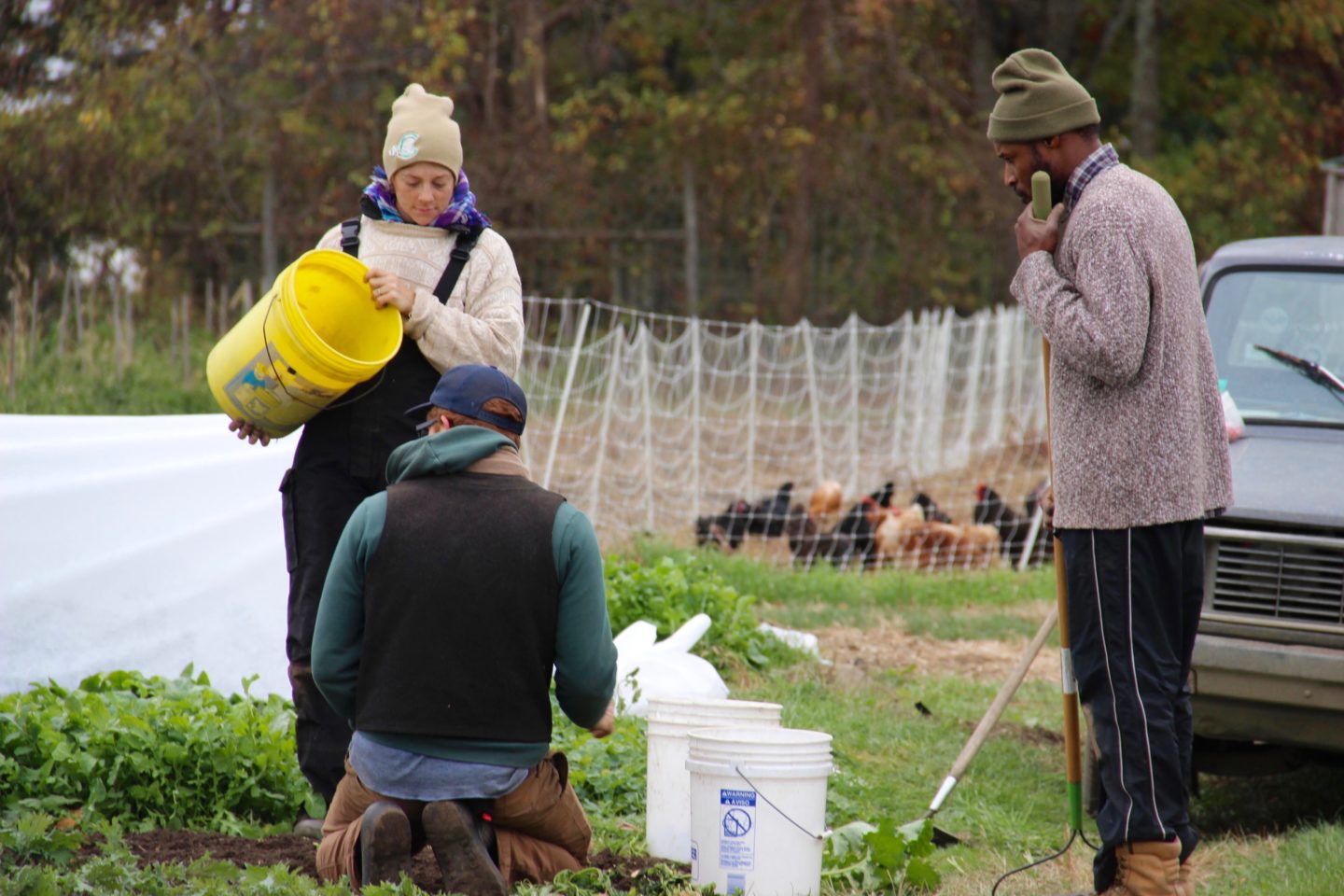
“Build a community. One of the strengths of Urban Edge Farm is that because the farmers support each other and the operation, the farm, as a whole, has been able to thrive.”
– Laura Bozzi, Southside Community Land Trust
Background
Managed by Providence, Rhode Island-based Southside Community Land Trust (SCLT), Urban Edge Farm is an incubator farm that helps aspiring farmers start their own enterprises. An incubator farm is designed to give new farmers access to affordable land, equipment, tools, infrastructure, and established markets, which helps new farmers learn the art of farming and create their own business brand. If a farmer flourishes, they can leave the incubator, buy their own land, and start their own business. Alternatively, if a farmer decides that farming is not for them, they can walk away with minimal investment.
Urban Edge Farm’s Creation Story
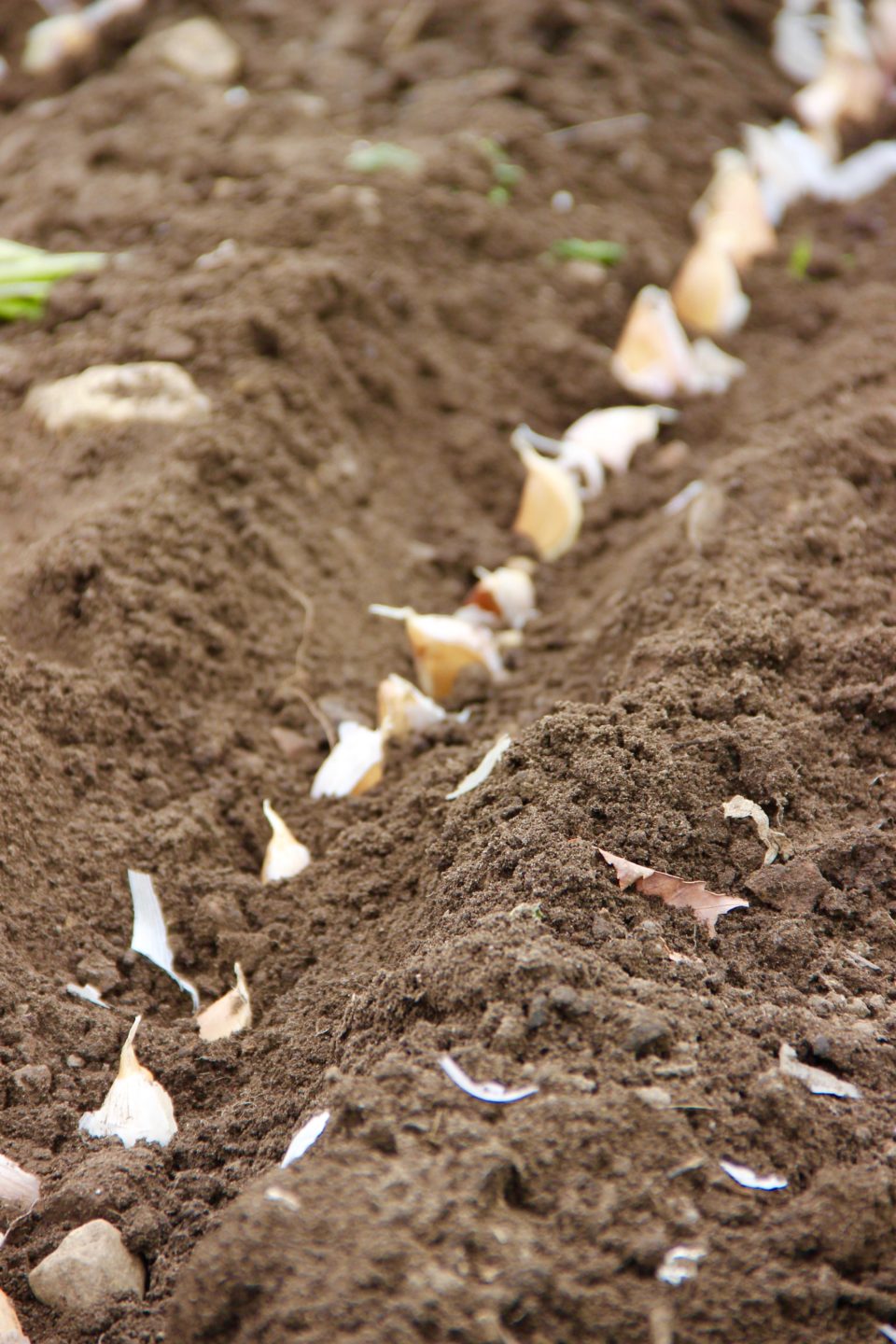 Urban Edge Farm grew out of SCLT’s many years of community garden programming in and around the City of Providence. SCLT’s first community garden started in 1981 on land purchased by the organization. SCLT’s mission is “to provide access to land, education, and other resources so that people in the Greater Providence region can grow food in environmentally sustainable ways and create community food systems where locally produced, affordable, and healthy food is available to all.” In service to this mission, in 2002 SCLT entered into a partnership with the State of Rhode Island to restore a parcel of inactive farmland to active farmland use. This parcel eventually became Urban Edge Farm.
Urban Edge Farm grew out of SCLT’s many years of community garden programming in and around the City of Providence. SCLT’s first community garden started in 1981 on land purchased by the organization. SCLT’s mission is “to provide access to land, education, and other resources so that people in the Greater Providence region can grow food in environmentally sustainable ways and create community food systems where locally produced, affordable, and healthy food is available to all.” In service to this mission, in 2002 SCLT entered into a partnership with the State of Rhode Island to restore a parcel of inactive farmland to active farmland use. This parcel eventually became Urban Edge Farm.
In 2002, Rhode Island purchased and preserved a parcel of land as part of its Open Space Preservation Act. The state sought a partner to manage the newly purchased parcel of land, and SCLT’s mission to preserve and protect land in an environmentally sustainable manner aligned with the state’s interest in preserving and protecting land. To facilitate the partnership, the state approved a long-term lease to SCLT for just $1. Additionally, to ensure preservation of the land, the state placed a conservation easement on the land that restricts development and promotes sustainability. This conservation easement binds SCLT, and therefore also binds the farmers at Urban Edge Farm. However, as the primary reason for the easement is to keep the land in farming, the development restrictions Rhode Island placed on the land via the easement have not had a significant impact on farm operations.
State Involvement In Daily Farm Operations
Although the State of Rhode Island supports Urban Edge Farm, it has little interaction with the farm on a day-to-day basis. SCLT is responsible for managing the property in collaboration with the farmers who lease there. Urban Edge Farm manager Laura Bozzi notes that this “hands-off” arrangement is very similar to the City of Providence’s interaction with the few of SCLT’s community gardens which are leased from it. “Both the state and the city are generally very supportive of the operations and have voiced interest in expanding to new farmland,” says Laura. However, neither governmental entity handles day-to-day farm administration.
In addition, the state’s conservation easement restricts but does not prohibit all development. Thus, with the state’s approval, SCLT may build certain types of new structures on the land, such as a greenhouse or a barn. When SCLT leased the Urban Edge Farm property, it already contained one barn, a house, and a few smaller structures. As the farm has grown, so has the need for additional structures. Still, Laura can’t remember the state ever denying one of SCLT’s requests to build. She says, “It is always possible for the state to reject one of Urban Edge’s plans, but that day hasn’t come yet.”
How Urban Edge Farm Works With Farmers
Urban Edge Farm currently has nine independent farm operations on the SCLT-leased land. Farmers on Urban Edge Farm pay SCLT by the acre. They also pay for the different services the farm provides. For example, farmers pay for the tractor by the hour and for the walk-in cooler by the square foot. When equipment needs to be repaired or updated, and there is no farmer directly responsible for the repair issue, the farmers split the expense evenly.
Additionally, SCLT requires that Urban Edge farmers follow organic farming standards set by the U.S. Department of Agriculture’s National Organic Program (USDA NOP). Urban Edge Farm also requires farmers follow certain land use protocols on top of NOP standards such as cover cropping, crop rotation, conducting soil testing, and maintaining field fertility. The requirement to maintain field fertility states that farmers must use practices such as lime, cover crops, compost and other organic material in fertilizing their fields. SCLT does not allow farmers to use meat or other volatile compost.
After paying rent by the acre, paying SLCT and other business expenses, and abiding by SCLT’s requirements for Urban Edge Farm tenants, the farmers operate as independent business entities when it comes to selling their crops. The farmers sell the majority of their products “at farmers markets, through community supported agriculture (CSA), to restaurants, and in small amounts to local schools.”
Benefits Of Farming At Urban Edge
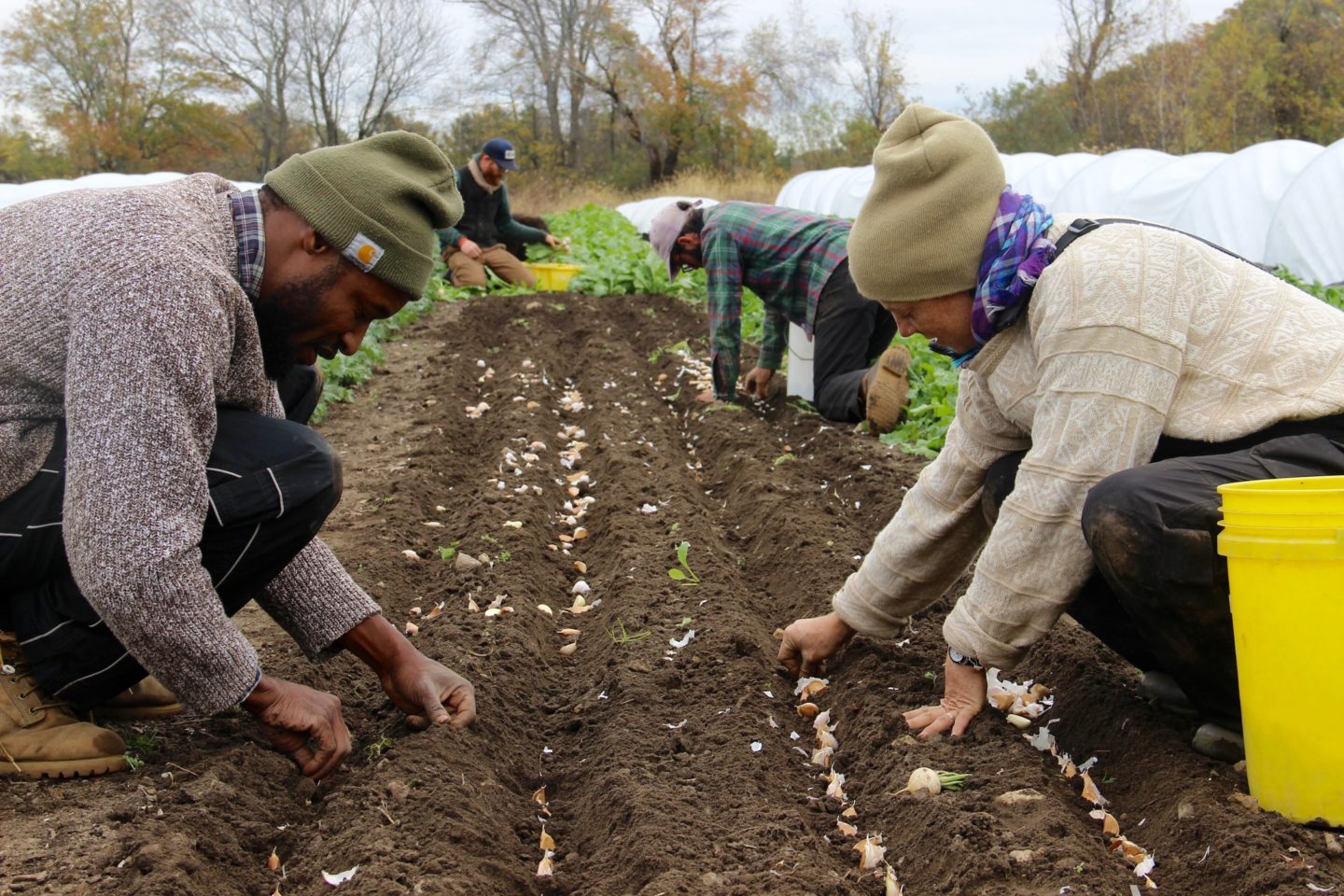 The farmers at Urban Edge Farm have been able to learn from one another and to grow as a unit. With nine farmers total, the group has been able to teach each other different skills in order to improve their farming and business techniques. Most of the farmers have established their own farm businesses on the incubator and sell their products accordingly. For example, Christina Dedora sells her flowers and herbs through Blue Skys Flower Farms and Michele Kozloski sells her eggs and produce through Zephyr Farm. Chang and her husband Ger Xiong sell their peppers, eggplants, and mixed greens through their own enterprise, Pak Express Farm.
The farmers at Urban Edge Farm have been able to learn from one another and to grow as a unit. With nine farmers total, the group has been able to teach each other different skills in order to improve their farming and business techniques. Most of the farmers have established their own farm businesses on the incubator and sell their products accordingly. For example, Christina Dedora sells her flowers and herbs through Blue Skys Flower Farms and Michele Kozloski sells her eggs and produce through Zephyr Farm. Chang and her husband Ger Xiong sell their peppers, eggplants, and mixed greens through their own enterprise, Pak Express Farm.
Despite working alongside one another, no formal relationship between the Urban Edge farmers exists. Instead, the farmers have developed informal relationships amongst themselves. Laura explained that “the farmers have been working together for so long that they have created an arrangement amongst themselves to keep the peace.” SCLT only requires the farmers attend monthly meetings to discuss farm maintenance and administration, and hasn’t had to resort to dispute resolution procedures. In fact, Laura laughed and said she’s “not even completely sure what the farmer’s leases specify as protocol for conflict resolution because it has never been an issue.” SCLT has dispute resolution procedures in place, which each lease explains, but the farmers have built a community among themselves and have dealt with inevitable community issues in a civil fashion. Laura noted that “this community mentality is, in part, the reason for Urban Edge Farm’s success.”
Challenges Of An Incubator Farm – For Farmers and SCLT
Laura identified the “tragedy of the commons” concept as a concern on incubator farms. With so many farmers using the same equipment and with no direct incentive to conserve resources, the farm sometimes experiences abuses. Laura used Urban Edge’s wash station as an example. Farmers do not pay to use the wash station, and therefore the farmers tend to use as much water as they want. This water use is costly for SCLT and excessive water use can damage the wash station. Laura noted that farmers that have been with Urban Edge Farm for a while recognized this struggle and became conscious of their impact. However, this type of tragedy of the commons issue is one of the reasons the incubator’s expenses can exceed the revenue it brings in through lease payments and equipment rentals.
To cover the shortfall and keep the incubator running, SCLT applies for funding through numerous federal programs and grants. Part of Laura’s daily responsibilities includes paying bills and managing cost-share funding from the USDA Natural Resources Conservation Service (NRCS) to help pay for conservation practices. When something is broken or when a new project is about to begin, it is Laura’s job to manage the budget and find appropriate funding sources. For example, SCLT is in the process of clearing four new acres of land for Urban Edge farmers to use and it has been Laura’s job to make sure the project is funded and runs efficiently.
As with anything, Laura recognizes that there are downsides to farming on a nonprofit incubator. Still, for the beginning farmers at Urban Edge Farm, she believes the benefits tend to outweigh the drawbacks.
Incubation vs. Long Term Tenure
When Urban Edge Farm began operating, the incubator provided year-to-year leases for its farmers. Now, the farm leases for periods of five years. Two of Urban Edge’s farmers are currently in the process of buying their own land and transitioning off of the incubator. In contrast, six of the farm’s current farmers have been farming at Urban Edge for over a decade.
Farm manager Laura notes that it is common for farmers to stay on an incubator farm longer than they initially intend. “Land is expensive, and incubator farmers have invested heavily into the soil on the incubator and don’t want to leave that investment behind,” she says. “Starting their own farm would require the farmers to start over from nothing. They would need to buy land with good soil, the necessary equipment and tools, and depending on where the new farm is located, establish a new customer base.”
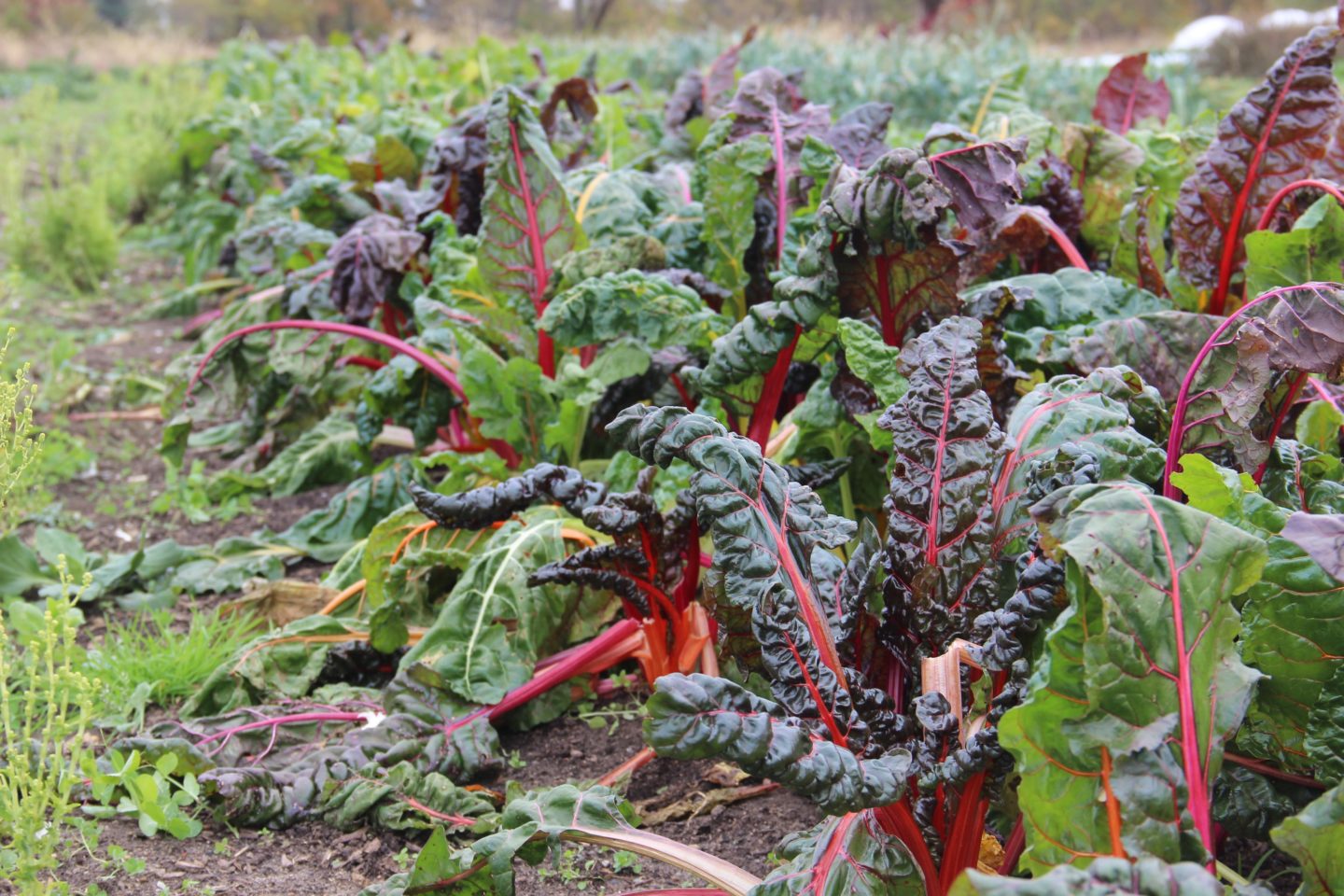 Laura explains that some incubator farms contemplate whether allowing farmers to stay on the incubator for long periods of time is a good practice. On the one hand, it allows farmers to reap the benefit of their hard work. Farming is difficult and expensive, and these farmers have devoted their time and efforts to nourishing this land. On the other hand, longer-term tenure runs counter to the mission of assisting farmers with the start-up process and then supporting them as they move to their own operation. Laura suggests that “anyone interested in creating an incubator farm should set out their expectations early to avoid such problems.” Ultimately, SCLT concluded that Urban Edge Farm is a strong and successful operation and would rather renew the farmer’s leases until they are truly prepared to leave the incubator than push them into beginning a new operation before they feel ready.
Laura explains that some incubator farms contemplate whether allowing farmers to stay on the incubator for long periods of time is a good practice. On the one hand, it allows farmers to reap the benefit of their hard work. Farming is difficult and expensive, and these farmers have devoted their time and efforts to nourishing this land. On the other hand, longer-term tenure runs counter to the mission of assisting farmers with the start-up process and then supporting them as they move to their own operation. Laura suggests that “anyone interested in creating an incubator farm should set out their expectations early to avoid such problems.” Ultimately, SCLT concluded that Urban Edge Farm is a strong and successful operation and would rather renew the farmer’s leases until they are truly prepared to leave the incubator than push them into beginning a new operation before they feel ready.
New Farmers and Apprentices
Open farmland does not stay open for long on Urban Edge Farm. SCLT finds that the “farmers already on the incubator are always interested in expanding their operation,” and if they’re not, part of SCLT’s mission as a nonprofit is to help immigrant and refugee farmers gain access to farmland. For that reason, Urban Edge Farm makes immigrant and refugee farmers aware of open land opportunities on the incubator right away. While being an immigrant or refugee is not a requirement, about 40% of farmers on Urban Edge Farm fall into this group.
Additionally, SCLT keeps land available for a grant-funded apprentice program. Currently, two apprentices are participating in a two day per week, 20-week program on Urban Edge Farm. The program teaches the enrolled apprentices the ins and outs of farming and starting a new operation. As with immigrant and refugee farmers, Urban Edge Farm offers open land to apprentices as soon as it becomes available. Laura said this is common for farms with apprentice programs because “it contributes to building a stronger community amongst the farmers.” The apprentices learn and then utilize what the incubator has to offer.
Laura believes that Urban Edge Farm creates an opportunity for beginning farmers that farmers can’t find elsewhere. The shared infrastructure and strong community ties make farming at Urban Edge both affordable and practical. For new farmers, an incubator provides potential mentors and marketing connections that are essential for success.
Laura’s advice to incubator farms and new farmers is to devote time to joining and strengthening the farming community they’re part of because “one of the strengths of Urban Edge Farm is that because the farmers support one another, the farm is able to thrive as a whole.”
